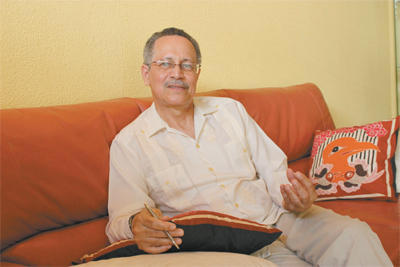Although it was established 40 years ago, the African, Caribbean and Pacific Group of States (ACP) is still relevant today says secretary general Dr Patrick Ignatius Gomes.
Guyanese-born Dr Gomes, who is in Trinidad & Tobago (T&T) for a few days before flying back on Tuesday to Brussels, Belgium, where the ACP headquarters is located, said the ACP was trying to shift from a dependency syndrome.
Now ten months into his five-year term at the ACP, Dr Gomes said his experience as secretary-general has so far been encouraging, demanding, challenging and interesting.
Before being elected to the position in December 2014, he was Guyana’s ambassador to the European Union and the Kingdom of Belgium and accredited to six other European nations, as well as being the country’s representative to the World Trade Organisation (WTO), Food and Agriculture Organisation, and the International Fund for Agricultural Development.
He is a permanent resident of T&T and spent 16 years at the University of the West Indies, St Augustine.
The ACP is a group of countries in Africa, the Caribbean, and the Pacific created by the Georgetown Agreement in 1975.
There are 48 countries from Sub-Saharan Africa, 16 from the Caribbean and 15 from the Pacific in the grouping which has as its main objectives sustainable development and poverty reduction within member states, as well as their greater integration into the world economy.
Dr Gomes said within the four decades of the ACP’s existence more middle-income countries and some least developed countries have emerged. Countries like T&T, the Bahamas and Barbados have graduated out of grants assistance.
“What we think is important is a focus on Small Island Developing States,” he said, adding that the ACP’s annual budget is U$S300 million.
In an interview at his home in Cherry Crescent, Westmoorings, yesterday, Dr Gomes told the Sunday Guardian: “The ACP is more relevant in certain areas because the initial, intrinsic idea of combining our bargaining resources as developing countries to address the market access now is more important.
“It’s more important because under the WTO, the rules for trade which are supposed to be regulated in a fair and balanced way are giving rise to what are called the mega-blocs. You have the Trans-Pacific Partnership formed already, and then the Trans-Atlantic Trade Investment Partnership that would link the two largest trading blocs—the US and Europe.”
Dr Gomes said the only way the ACP could pursue development for developing countries is by combining resources. Therefore, the focus cannot be just aid.
“We have moved far beyond that. The ACP now is looking at how we can abolish aid so development can take place.”
That, he explained, meant earning the value of natural resources, human resources and organisational capacity in a way that generated development.
“That is to be self-sustaining and self-reliant,” he said.
In May, Papua New Guinea will host the Eighth Summit of ACP Heads of State and Government. T&T’s Minister of Foreign Affairs is expected to attend.
Many benefits for T&T
Dr Gomes said T&T has benefited from the ACP mostly through trade agreements.
“T&T also benefited when there were preferential trade agreements for sugar when it was around, but also trade relations with Europe and that European market. T&T is one of the few countries in the developing world that has a positive balance of trade with Europe in terms of its petroleum products and investments,” he said.
Many of the benefits have also come about because of the South-South co-operation dimension. Another was through linking universities including UWI’s campuses through a programme called Edu-Link which provides funding for training, research, capacity building and mobility of postgraduate students.
“What that does is expose our developing countries to the technological advances of other countries and European universities,” he said.
T&T, in particular has benefited “more than ever” through its annual film festival.
“That is to be a take-off point for the whole creative industries…how film, media and other areas in which youth entrepreneurship with ICT can be advanced,” Dr Gomes said.
He said a fair amount of work was being done in agriculture through the Caribbean Agricultural Researchn Development Institute (Cardi) which was looking at the impact of climate change, as well as a rehabilitation programme for the coconut industry which has enormous potential.
Another area is the opportunity for T&T’s professionals to serve abroad.
“There have been great ambassadors in Geneva and Brussels negotiating and playing a part and also enriching their experience and bringing it back here. Trinidad has also made a significant contribution in the International Criminal Court by having Justice Geoffrey Henderson there.”
Asked how T&T can benefit in dealing with problems like poverty, human trafficking and drugs, he said it depends on what is in the national plan.
“If you’ve identified a drug programme…how that needs institutional capacity, how it needs lessons and significant policies that have been successful in other countries, we can facilitate agencies to be supportive of work to be done in Trinidad and Tobago.”
*This article was originally published on January 3 in Trinidad & Tobago Guardian Online (INPS | 9 January 2016)

